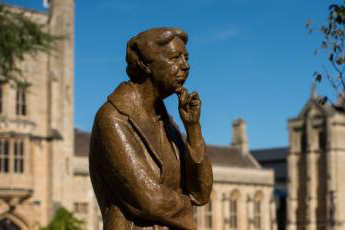I write from Tokyo this week where I am honouring a longstanding commitment to address business and human rights issues. But there is nowhere in the world I would rather be today - professionally or personally - than with you at the Bonavero Institute in Oxford. I regret missing the chance to discuss with colleagues and friends the past, present and future of an agenda that Sir Geoffrey Chandler did so much to shape, at a university where I studied history when not drinking pints in the pubs and taking walks in the parks. Thanks for indulging me with a few words.
Many autocratic regimes are acting with even more brazen impunity and some liberal democracies are becoming illiberal amidst the toxic fumes of populism and nationalism.
I first met Sir Geoffrey in June 1999 when, on behalf of the US State Department, I began meeting and learning from the then few great and the good - Geoffrey foremost among them - in the nascent business and human rights world in London. Indeed, it was an FT Comment piece he published the previous year on the human rights responsibilities of oil companies in conflict zones that first inspired me to use the convening power of the US Government to negotiate what became the Voluntary Principles on Security and Human Rights. Of course I was only one of many who Geoffrey inspired and encouraged in our work. As honoured as I was to be advised by the father of business and human rights, I was even more touched personally when a few years later he gave me a signed copy of his memoir as a wartime commando behind enemy lines in Greece. I learned then that he was not only a man of vision and wisdom, but fearless in pursuit of his mission. Those are the qualities we need now more than ever.
The norms and rules, institutions and standards that have emerged to safeguard human rights over these last 70 years are under assault.
For all of the progress that we have made over the last nearly quarter century, we meet at a time of geopolitical disruption. Many autocratic regimes are acting with even more brazen impunity and some liberal democracies are becoming illiberal amidst the toxic fumes of populism and nationalism. The shared space of civic freedoms is coming under pressure and at the same time human rights defenders are under attack. The norms and rules, institutions and standards that have emerged to safeguard human rights over these last 70 years are under assault.
Eleanor Roosevelt, her splendid new statute standing watch outside here in the Mansfield quad, would call on us to defend those ramparts under siege. And Sir Geoffrey might tell us some hard truths about the business and human rights movement:
We may be past the end of the beginning, but our work will never end.
The UN Guiding Principles are the floor but not the ceiling and while it remains more urgent to nail down the floor, it will always be even more important to raise the ceiling.
The UNSDGs complement but must not substitute for the UNGPs - and sustainable development depends on both respect for human rights and empowerment of civil society.
Climate change is a fundamental human rights issue, putting our political and civil, economic, social and cultural rights all at fatal risk.
"Me too" means us all; without gender and LGBTI rights there are no human rights.
Corporate responsibility for human rights may be established as a principle but remains to be realised by most companies - and even then is only a way station toward corporate accountability for human rights.
Transparency must not be mistaken for accountability, nor commitment for performance.
Corporate responsibility and accountability are necessary but not sufficient and should supplement, not supplant, government responsibility and accountability based on democratic institutions, the rule of law and respect for human rights.
The shared space of civic freedoms should align business and civil society and if taken for granted and not defended by companies, will be further degraded to the detriment of both.
I believe that Geoffrey would tell us these hard truths. A reasonable person, he would find no reason to compromise on any of them. And after making the business case for human rights as eloquently and persuasively as anyone ever has or ever will, he would remind us "to hell with the business case; it's about doing the right thing."
After making the business case for human rights, Geoffrey Chandler would remind us "to hell with the business case; it's about doing the right thing."
Sir Geoffrey was our leader in the early history of the business and human rights. A heroic figure, he as much as anyone defined an epic agenda for the future. Thank you for the chance to try, in absentia, to take inspiration from this great man, now at rest but forever restless in his and our quest.





























How should businesses respond to an age of conflict and uncertainty?
As 2024 began, European Commission President Ursula von der Leyen aptly summed up our deeply worrying collective moment. As she put it, speaking at the annual World Economic Forum in Switzerland, we are moving through “an era of conflict and...
26 March 2024 | Commentary
Commentary by Scott Jerbi, Senior Advisor, Policy & Outreach, IHRB